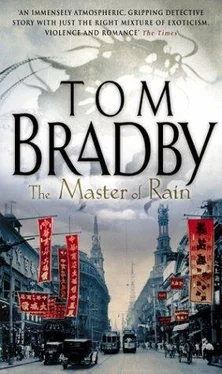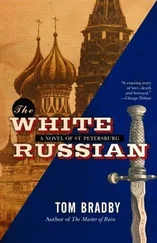“Someone runs the group from the inside. The commissioner is a joke, but is probably paid for his silence.”
“You don’t know who runs them?”
“We don’t know for certain.”
“Is it Granger?”
“He’s your boss, Field.”
“You think Granger heads this group… the cabal. He orchestrates…”
“He’s your boss, Field.”
“I’m asking you.”
Caprisi shrugged. “Have you seen the way he dresses?”
Field stared out of the window.
“Last year it came to a head. We were closing down opium dens on Foochow Road. Lu didn’t like it and neither did the cabal. For each raid, we needed uniform support, and every time we went out, even if we’d planned it at short notice, they were expecting us. We started to find we were being followed after work-all of us. By Lu’s men, mostly, but they always seemed to know where we were going and what we were doing. And then they struck without warning. We were ambushed on our way out to a raid. Two of our detectives were killed, and Macleod ordered a tactical retreat, but he’s not forgotten and neither have I.”
“Is that when Slugger…”
Caprisi shook his head. “That’s enough.”
Field sighed and returned to looking out of the window. “It would be easier if you trusted me,” he said.
There was a long silence, until Caprisi said, “I do.”
“Why?”
“I don’t know. Instinct.”
Field took out his cigarettes and offered one to Caprisi, who shook his head.
“Macleod hates Granger,” Field said.
Caprisi didn’t answer.
“Because he thinks Granger is head of the cabal.”
“Yes, but it’s more than that. Macleod was brought up by his mother, in one of the roughest parts of Glasgow. He has a pathological hatred of disorder and decay and greed. His father was a womanizer and gambler, who ran off with a prostitute and left them in poverty. So if you take a look at Granger, I think you’ll get the picture.”
“Is Macleod married?”
“Yes.”
“Yes… but?”
“He married a Chinese girl, but the council disapproves, so he never talks about it, or allows anyone to meet her.”
Field turned back to the window.
“He seems rough, Field, but he’s loyal to those he cares about.”
Field faced his colleague again. He sensed he was expected to give an answer. “I can see that,” he said.
The Majestic was empty, save for two elderly Chinese women who were scrubbing the floor on their hands and knees, lonely figures in front of the big mirrors at the far end of this cavernous room. The porter led Field and Caprisi through a wooden door in the far wall and up a steep, narrow staircase.
At the top was a tiny balcony, with an empty hatstand.
The porter knocked once on the door and a woman answered, “Come.”
It was an attic room, painted red, with long sloping ceilings and a single small casement window, both sides of which were open. The woman sat at her desk, dressed elegantly in black, a silver chain around her neck, her white hair-long, like Natasha’s-tied up at the back of her head.
“You’ve come about Lena,” she said.
“Yes, but…”
“I’ve been expecting you.”
She turned her chair, her big, bony nose less prominent face-on, and gestured for them both to sit. All around the walls, Field saw pictures and posters of theatrical productions, mostly from Moscow and St. Petersburg.
“You knew her, obviously.”
“Poor Lena.” She sighed. “Yes, Lena was one of my girls.”
Caprisi took out his notebook and pencil. “Could I take your name, Miss…”
“Mrs. I’m Mrs. Orlov.” Caprisi looked up at her. “No relation.”
“What kind of work did Lena do here?” the American asked.
She sighed again. “Would you like some tea… coffee?”
They both shook their heads. Mrs. Orlov took her time, as if not wanting to be rushed. “Lena was… what can I say?” She was staring at the floor. “Lena was a dreamer. She dreamed of escape, a new beginning. New York, Paris, London, Rome. A life beyond the circumstances she found for herself here.”
“She was a prostitute?”
The woman wrinkled her nose, but expressed no surprise or disgust. “She was a dancer, Officer. I don’t know what arrangements were made beyond these walls.”
“But you know arrangements were made?”
“Each girl is different. Some do, some don’t.”
“Down to money.”
“Down to character. All the girls have impaired circumstances, or they wouldn’t be here.”
This was said, Field thought, as a matter of fact, without any hint of disapproval at those girls who used the opportunities the Majestic offered to take matters further.
“But Lena did make arrangements,” Caprisi persisted.
“I believe so, yes.”
“Why? Were her circumstances-”
“I believe she had a sister to support. But, as I said, each girl makes her own choice. Life is easier if you succumb, harder if you don’t.”
Field found this an uncomfortable line of thought.
“Whom did Lena make arrangements with?” Caprisi asked.
The woman shook her head. “I don’t know precisely, but-”
“She lived-”
“Hold on, I was coming to that.” The woman looked at Caprisi reprovingly for a moment. “About three months ago she moved into a new flat on Foochow Road.”
“Owned by Lu Huang.”
“Yes.”
“So she was his girl?”
“Yes. And no.”
Caprisi frowned.
“Lu Huang has many girls, but I’m not sure they all serve the same purpose.”
“You mean he doesn’t sleep with them all?”
She shook her head again. “I don’t know, but I don’t think Lena was his girl in that sense. She was not a concubine. I don’t doubt that he basically owned her, and paid for her life, but I’m not sure what his purpose was.”
Caprisi was sucking the end of his pencil.
“Lu has an intelligence network,” Field said, assuming this is what the woman was driving at.
She turned to him. “Yes.”
“Lena gave him intelligence on the activities of Bolsheviks like Borodin?”
“Yes.”
“Didn’t the Bolsheviks find her suspect because of her past?”
“Everyone can be anyone in Shanghai, Detective.”
Field looked at Caprisi, who produced Lena’s notebook. “Ships, dates, and destinations,” Caprisi said.
She looked at it and handed it back. “It means nothing to me.”
“Opium, possibly.”
She shook her head curtly.
Caprisi folded it and put it into his pocket. “So if she was Lu’s girl, she wasn’t sleeping around. I mean-”
“Not unless he instructed her to.”
“Unless he gave her to someone?”
“Yes.”
“And did he?”
“I believe so. I don’t know who, but I never saw her so happy.”
Caprisi leaned back in his chair again, looking around the room. Field thought the woman probably knew more than she was letting on.
“How was her… mood… since she moved into Lu’s apartment?” Caprisi asked. “Three months ago, you say?”
“She still came, still danced, but there was something different.”
“To do with Lu, or this new man?”
“I do not know, but she talked of escape more often, with more conviction and… a sense of confidence. I think she felt she’d found some… some route to a new beginning, to whatever it was she sought. One of the last things she said to me, the day before yesterday, was that she had written to her sister and asked her to come to Shanghai.”
“What’s the relevance of that?”
“She would never have wanted her sister to know about her life here. It could only have been because she was planning that they both leave.”
Читать дальше












